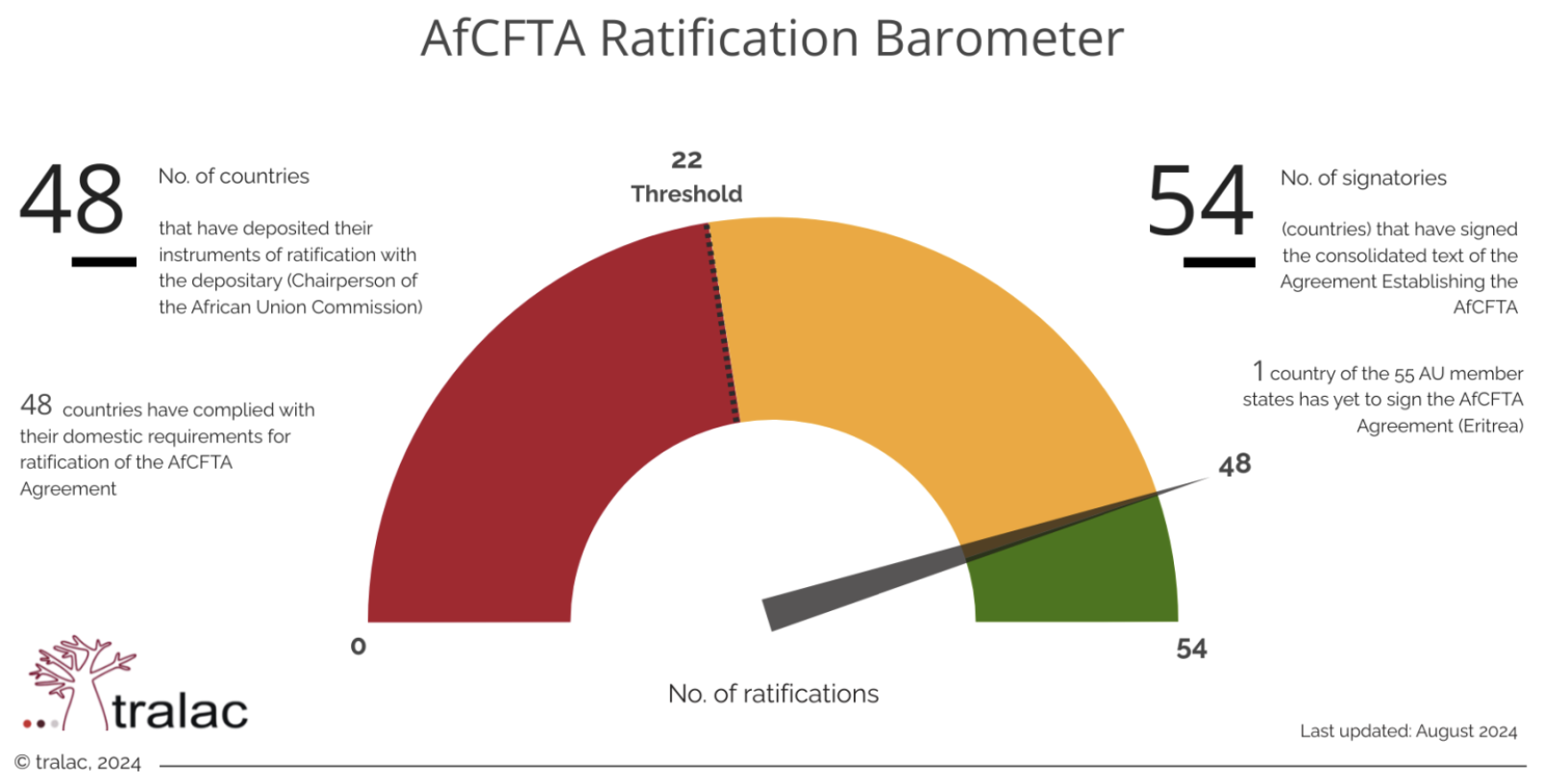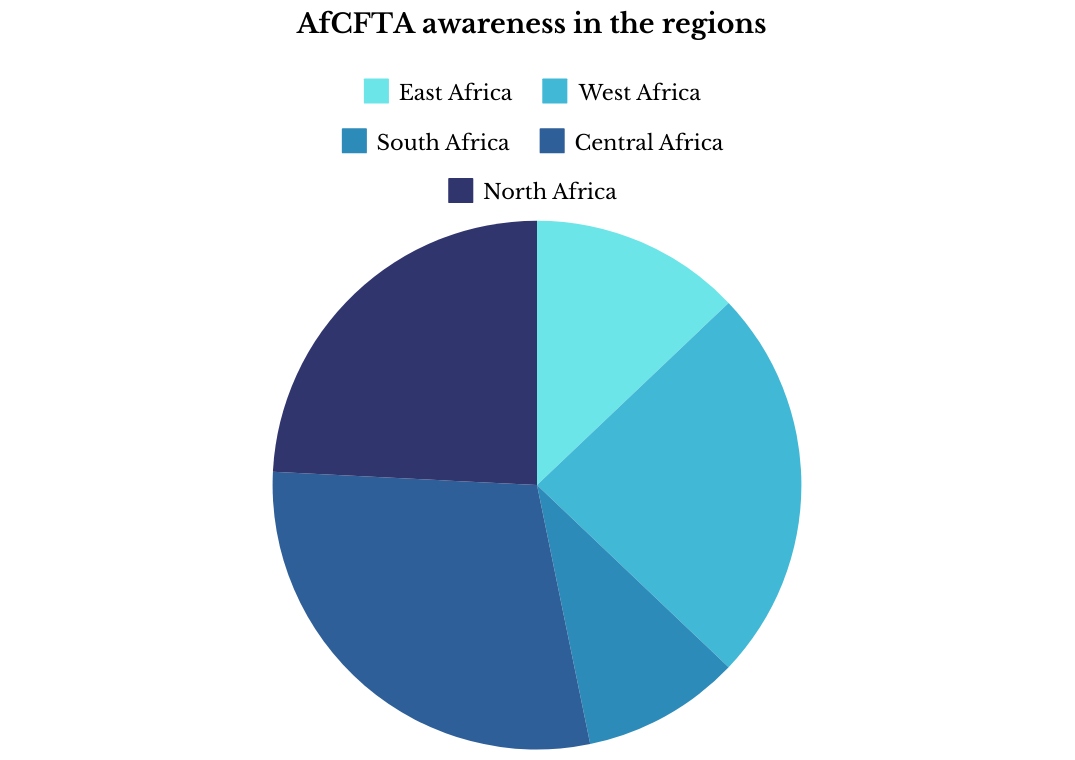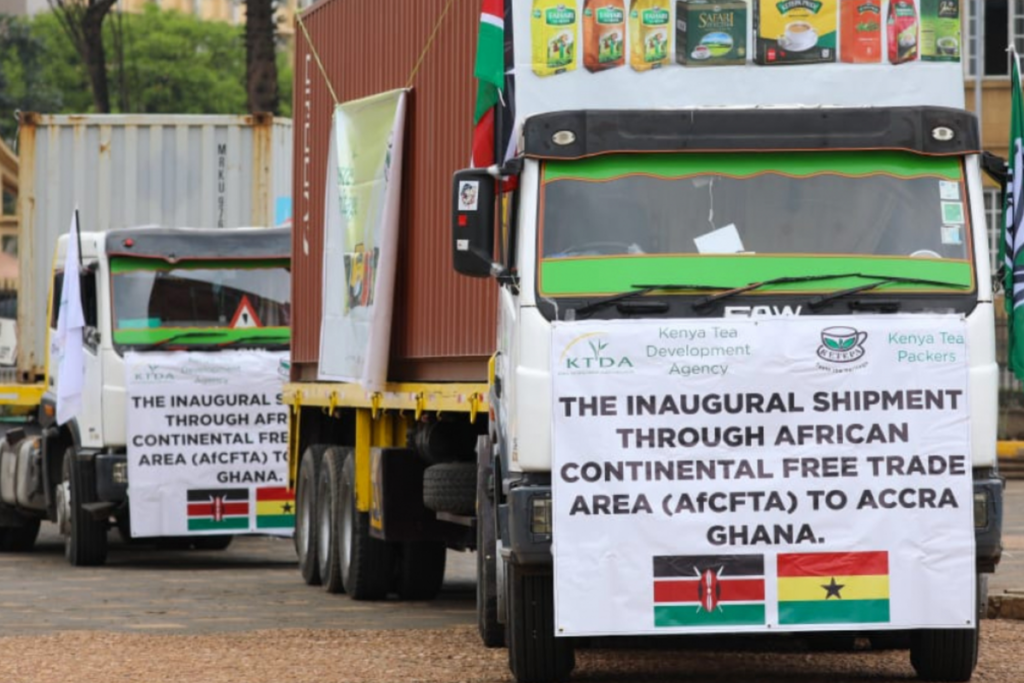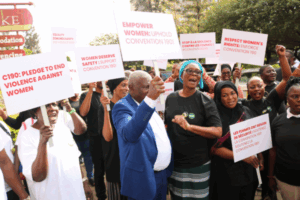The AfCFTA agreement, reviewed every five years, reached its first milestone in May 2024, offering trade unions a chance to reflect on past negotiations and trade policy positioning.
At the East African Trade Union Confederation (EATUC) forum held in Rwanda this August, unions focused on three main goals: reviewing the first five years of the AfCFTA and its impact on workers, understanding the AfCFTA review roadmap, and developing strategies for engaging in the review process.
The EATUC forum is part of a broader ITUC-Africa advocacy on the AfCFTA involving nine countries.

EATUC sub-regional forum theme: Five Years of the AfCFTA – Progress, lessons learnt and mechanisms to mainstream labour rights | August 2024, Rwanda.
AfCFTA after five years: Status and negotiations update
The AfCFTA aims to create a single market for goods and services, facilitate the free movement of people, attract investment, and ultimately establish a Continental Customs Union. However, it remains uncertain whether the AfCFTA will meet aspirations for economic transformation, development, and integration.
The large-scale liberalisation under the AfCFTA has significant consequences for labour, impacting jobs, worker protection, social security, and trade union rights. Notably, the Agreement lacks any labour provisions. Trade unions advocate for a robust set of labour provisions beyond core ILO conventions, encompassing economic value, collective bargaining agreements, value addition, and civil society participation in AfCFTA national implementation committees.
Ratification status:
54 of the 55 African Union (AU) member states have signed the agreement, with 48 ratifying it.

Negotiations update:
46 tariff offers on trade in goods have been verified according to agreed liberalisation modalities.
The Rules of Origin (RoO) now cover approximately 92.4%, though the textile, clothing, and automobile sectors remain unresolved.
48 Member States have submitted initial trade in services offers in the five AfCFTA priority sectors. 22 draft Schedules of Specific Commitments were adopted for provisional implementation from these offers. The 2024 AU Summit commended East African Community (EAC) member states for gazetting their adopted Schedules of Specific Commitments.
Phase 2 and 3 Protocols Adopted: competition, investment, intellectual property rights, women and youth in trade, and digital trade.
The Guided Trade Initiative has expanded to facilitate matchmaking for exports and imports among participating countries, in coordination with their AfCFTA implementation committees.
National implementation has begun, with 25 countries and one regional economic community (REC) validating their strategies, while 12 more countries and three RECs are currently drafting theirs.
The Appellate Body, established under the Disputes Protocol, will handle case appeals.
READ: Second Edition of LRS National Centres Briefing on the AfCFTA – An update on negotiations.
Trade unions understand the possibility of the AfCFTA and have certain demands.
ITUC-Africa national centres involved in AfCFTA advocacy are building union expertise on trade experts and capacities to promote decent work and monitor the agreement’s implementation.
For example, the Rwanda Workers’ Trade Union Confederation (CESTRAR) has taken a more active role in trade policy, raising awareness and understanding of the AfCFTA among its affiliates. The Ministry of Commerce invited CESTRAR to join the national steering committee for the AfCFTA. Additionally, CESTRAR has provided input on a ministerial order concerning migrant workers in Rwanda and has been involved in regional discussions through EATUC and the EAC. However, CESTRAR faces challenges such as limited financial resources, the absence of a dedicated forum for AfCFTA discussions, and difficulties coordinating with the government and other stakeholders.
The Central Organization of Trade Unions (COTU-Kenya) has several key initiatives aimed at amplifying the voice of workers within the AfCFTA framework:
- A technical committee on trade and development to establish clear guidelines for formulating trade positions and develop trade experts who can participate in AfCFTA discussions.
- Capacity-building for affiliates to raise awareness about the union’s role in the AfCFTA.
Sensitisation meeting on the role of trade unions in the AfCFTA with the COTU (K) top union leadership.
Development of an advocacy strategy to lobby for the inclusion of trade unions in the National Implementation Committee.
Develop trade union research to support the advocacy campaigns and participation of trade unions in the AfCFTA at a national level.
Trade unions were not involved in developing the national AfCFTA implementation strategy, and workers have been left out of the communication efforts. However, the awareness-raising plan recognises women, youth, and people with disabilities as a key audience. COTU-K plans to use this recognition to advocate for a more inclusive AfCFTA.
COTU-K draws on its experiences from initiatives such as the African Growth and Opportunity Act (AGOA) and Economic Partnership Agreements (EPAs). COTU-K’s trategic partnerships include the National Labour Board – a tripartite body comprising the government, the Federation of Kenya Employers, and COTU-Ke.
Workers’ perceptions of AfCFTA: Survey on awareness, knowledge, and challenges
Projected employment growth in the EAC is expected to occur in manufacturing, agriculture, and the informal sector, raising concerns about decent work and social justice standards.
Effective trade union advocacy requires active worker engagement across all sectors. A worker survey conducted by ALREI highlighted key insights:
Awareness: 78.8% of workers know about the AfCFTA, yet 60.4% struggle to understand its impact.
Perceptions: 67.6% believe AfCFTA will benefit African workers, though 45.1% have concerns. Over 80% are willing to advocate for the agreement.
Relevance: AfCFTA is seen as more relevant to skilled workers, youth, and women, with challenges remaining for informal workers, women in unskilled jobs, and youth.

AfCFTA review: An opportunity for unions to push for labour provisions
This Agreement shall be subject to review every five (5) years after its entry into force by State Parties to ensure effectiveness, deeper integration, and adaptability to evolving regional and international developments.”
- Article 28 of the AfCFTA Agreement
Trade union priorities and demands for the AfCFTA review
Labour rights are human rights.
- AfCFTA member states must uphold ILO conventions on freedom of association.
- Labour rights in the agreement’s preamble and objectives.
- Integrate labour provisions into the Trade in Goods and Services Protocols.
- An AfCFTA Annex on labour in the main agreement.
- Labour rights compliance certification under Rules of Origin.
Free movement of persons and labour migration
- e-immigration systems to simplify cross-border worker movement.
- Encourage countries to sign and ratify the AU Free Movement of Persons Protocol. The protocol has eleven labour migration/mobility-related provisions. 32 countries have signed, but only four have ratified the protocol, whereas 15 are needed for the protocol to take effect.
- End discriminatory practices against African expatriates, for example, Nigeria’s Expatriate Employment Levy.
Implement Mutual Recognition Agreements (MRAs) at RECs level – Article 10 of the Protocol in Trade in Services calls for mutual recognition of education, experience, licenses, or certifications obtained or requirements met.
Formal social dialogue mechanisms – Member states must establish mechanisms for meaningful social dialogue and include trade unions, women, youth, and informal economy actors in national AfCFTA implementation frameworks
Case study: Rwanda Mountain Tea - An example of workers' welfare under the AfCFTA
Rwanda Mountain Tea demonstrates how companies can leverage the AfCFTA to grow their business while prioritising workers' rights. Through the AfCFTA, the company has capitalised on economies of scale, eliminated middlemen, and built strategic partnerships. The company, supported by the commerce ministry, has invested in staff training on the AfCFTA e-tariff platform and maintains strong compliance with labour standards through partnerships with CESTRAR and government agencies. Businesses can align with AfCFTA’s goals while upholding labour rights.
- Article 28 of the AfCFTA Agreement







